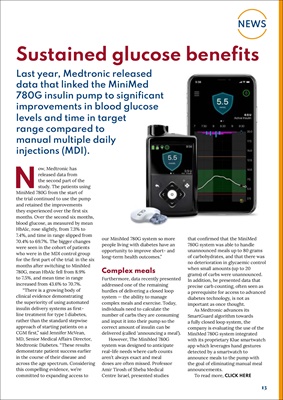
13
NEWS
Sustained glucose benefits
levels and time in target
range compared to
manual multiple daily
injections (MDI).
that confirmed that the MiniMed
780G system was able to handle
unannounced meals up to 80 grams
of carbohydrates, and that there was
no deterioration in glycaemic control
when small amounts (up to 20
grams) of carbs were unannounced.
In addition, he presented data that
precise carb counting, often seen as
a prerequisite for access to advanced
diabetes technology, is not as
important as once thought.
As Medtronic advances its
SmartGuard algorithm towards
a fully closed loop system, the
company is evaluating the use of the
MiniMed 780G system integrated
with its proprietary Klue smartwatch
app which leverages hand gestures
detected by a smartwatch to
announce meals to the pump with
the goal of eliminating manual meal
announcements.
To read more, CLICK HERE
Last year, Medtronic released
data that linked the MiniMed
780G insulin pump to significant
improvements in blood glucose
Now, Medtronic has
released data from
the second part of the
study. The patients using
MiniMed 780G from the start of
the trial continued to use the pump
and retained the improvements
they experienced over the first six
months. Over the second six months,
blood glucose, as measured by mean
HbA1c, rose slightly, from 7.3% to
7.4%, and time in range slipped from
70.4% to 69.7%. The bigger changes
were seen in the cohort of patients
who were in the MDI control group
for the first part of the trial: in the six
months after switching to MiniMed
780G, mean HbA1c fell from 8.9%
to 7.5%, and mean time in range
increased from 43.6% to 70.7%.
"There is a growing body of
clinical evidence demonstrating
the superiority of using automated
insulin delivery systems as firstline treatment
for type 1 diabetes,
rather than the standard stepwise
approach of starting patients on a
CGM first," said Jennifer McVean,
MD, Senior Medical Affairs Director,
Medtronic Diabetes. "These results
demonstrate patient success earlier
in the course of their disease and
across the age spectrum. Considering
this compelling evidence, we're
committed to expanding access to
our MiniMed 780G system so more
people living with diabetes have an
opportunity to improve short- and
long-term health outcomes."
Complex meals
Furthermore, data recently presented
addressed one of the remaining
hurdles of delivering a closed loop
system - the ability to manage
complex meals and exercise. Today,
individuals need to calculate the
number of carbs they are consuming
and input it into their pump so the
correct amount of insulin can be
delivered (called 'announcing a meal').
However, The MiniMed 780G
system was designed to anticipate
real-life needs where carb counts
aren't always exact and meal
doses are often missed. Professor
Amir Tirosh of Sheba Medical
Centre Israel, presented studies